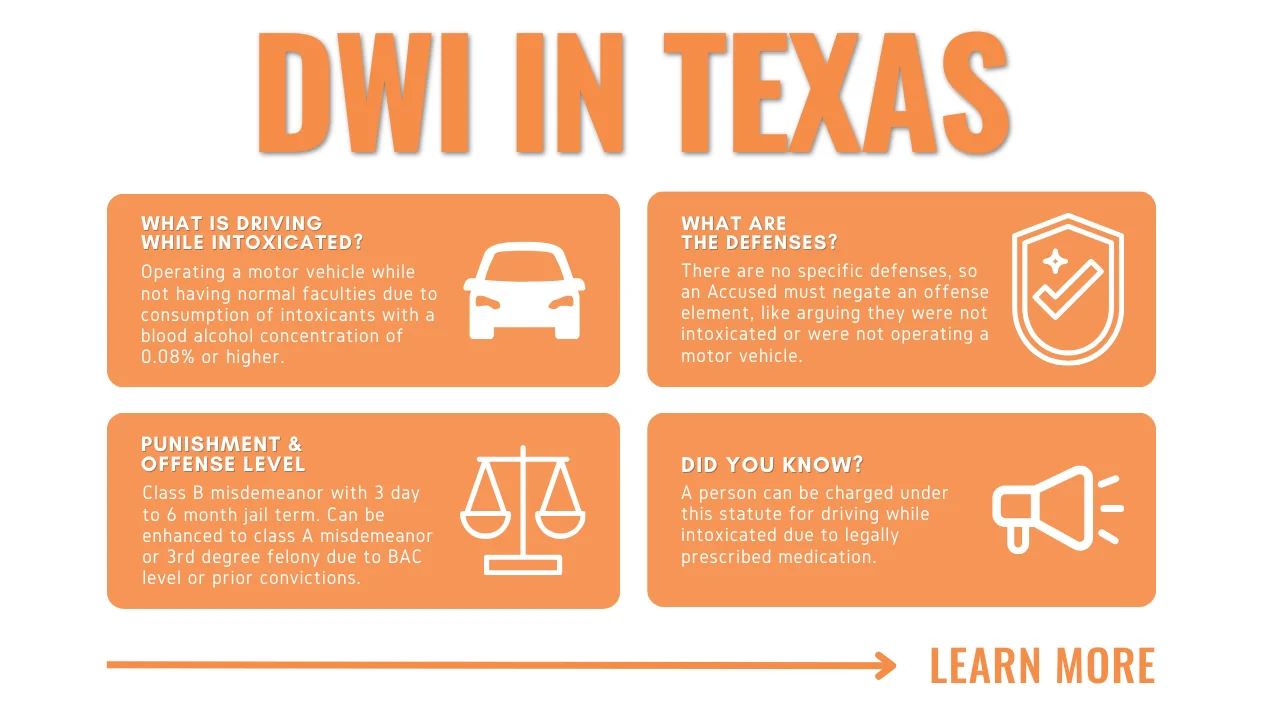
CAN YOU LOSE YOUR MEDICAL LICENSE FOR A DWI IN TEXAS?
A misdemeanor DWI conviction alone will normally not cause a Texas medical license suspension. However, Texas Occupations Code § 164.057 does require a medical license suspension upon conviction for felony DWI, including Intoxication Assault, and Intoxication Manslaughter. Additionally, repeat intoxication offenses, including non-aggravated DWI and Public Intoxication, can lead to disciplinary action and even suspension when the Texas Medical Board concludes the physician to have a substance abuse addiction that endangers their patients.
- What happens to a doctor who gets a DUI in Texas? A DWI will result in disciplinary action by the state medical board for Texas physicians. This includes mandated drug and alcohol treatment, participation in the Texas Physician Health Program, and even suspension or revocation of the physician’s medical license in severe cases. The state board determines appropriate action in each situation individually by considering a variety of factors including the facts of the offense and whether it interferes with the physician’s ability to care for patients.
- Do you have to report arrests to the Texas Medical Board? Arrests must be reported to the Texas Medical Board for new physician applicants and during the renewal process for licensed physicians.Outside of these two periods, Texas law does not require an active physician to report an initial arrest to the medical board. However, there is a duty to self-report if the charge results in a conviction. In these instances the physician must report the offense to the medical board within 30 days of conviction.One important detail, this self-reporting duty only requires:
-
- Reporting convictions for felonies, class A misdemeanors, class B misdemeanors, and class C misdemeanors of moral turpitude (the most common class C misdemeanors of moral turpitude are Assault involving domestic violence and Theft).
- A description of previously reported charges that resulted in a no contest plea, conviction, deferred adjudication, pretrial diversion, or where the presiding court finds sufficient facts of guilt and continues the case to a later date.
WHAT MUST BE REPORTED TO THE TEXAS MEDICAL BOARD?
Physicians must report criminal convictions for felonies, class A misdemeanors, class B misdemeanors, and class C misdemeanors of moral turpitude. Physicians must also report deferred adjudication for a felony, or for a class A misdemeanor, or class B misdemeanor for medicare/medicaid or insurance fraud, the Texas Controlled Substances Act or intoxication or alcoholic beverages offenses, sexual or assaultive offenses, and tax fraud or evasion.
Physicians must provide a description of previously reported charges that resulted in a no contest plea, conviction, deferred adjudication, pretrial diversion, or where the presiding court finds sufficient facts of guilt and continues the case to a later date.
Finally, physicians are required to report any previously unreported arrest when they are applying for renewal of their license in Texas.
- What are the duties of the Texas Medical Board? The Texas Medical Board is responsible for the certification, licensing, and oversight of physicians and other healthcare professionals in the state. The board imposes disciplinary action for misconduct where appropriate, including drug and alcohol rehabilitation, and medical license suspension in severe circumstances.
- How do doctors get disciplined? Title 3 section 164 of the Texas Occupations Code provides the statutory grounds for Texas Medical Board discipline of state doctors, which can include mandated drug and alcohol treatment, participation in the Texas Physician Health Program, probation, drug testing, sobriety, behavioral, and mental health therapy, and even suspension in certain circumstances.When the board receives a report of criminal conduct they conduct an investigation and evaluation to determine if further action or proceeding to a full hearing is warranted.The board then determines appropriate discipline by considering several factors such as the nature/severity of the offense and how it relates to the physician’s ability to practice medicine with reasonable skill and safety to patients.
WHICH OF THE FOLLOWING IS A REASON FOR REVOKING A PHYSICIAN’S LICENSE?
Texas Occupations Code section 164.057 requires the Texas Medical Board to suspend a physician’s medical license upon evidence the physician has been:
(1) initially convicted of:
(A) a felony;
(B) a misdemeanor under Chapter 22, Penal Code, other than a misdemeanor punishable by fine only;
(C) a misdemeanor on conviction of which a defendant is required to register as a sex offender under Chapter 62, Code of Criminal Procedure;
(D) a misdemeanor under Section 25.07, Penal Code; or
(E) a misdemeanor under Section 25.071, Penal Code; or
(2) subject to an initial finding by the trier of fact of guilt of a felony under:
(A) Chapter 481 or 483, Health and Safety Code;
(B) Section 485.033, Health and Safety Code; or
(C) the Comprehensive Drug Abuse Prevention and Control Act of 1970 (21 U.S.C. Section 801 et seq.).
(b) On final conviction for an offense described by Subsection (a), the board shall revoke the physician’s license.
(c) The board shall revoke the license of a physician placed on deferred adjudication community supervision for an offense under:
(1) Section 22.011(a)(2), Penal Code (sexual assault of a child);
(2) Section 22.021(a)(1)(B), Penal Code (aggravated sexual assault of a child); or
(3) Section 21.11, Penal Code (indecency with a child).
- If you are arrested for assault, you must notify the medical board within? A physician is required to notify the Texas Medical Board of an assault arrest (including Assault-Bodily Injury) only when they are renewing their medical license. However, if the assault arrest leads to a criminal conviction the physician must notify the board within 30 days.With regards to any unadjudicated assault arrest previously reported to the board, the physician has 30 days update the board and report a no contest plea, conviction, deferred adjudication, pretrial diversion, or if the presiding court finds sufficient facts of guilt and continues the case to a later date.
- What are some events a physician has a duty to report in Texas? Physicians have varying duties to report criminal conduct in Texas but must report convictions for felonies, class A misdemeanors, class B misdemeanors, and class C misdemeanors of moral turpitude. Physicians must also report deferred adjudication for a felony, or for a class A misdemeanor, or class B misdemeanor for medicare/medicaid or insurance fraud, the Texas Controlled Substances Act or intoxication or alcohol beverages offenses, sexual or assaultive offenses, and tax fraud or evasion.Physicians must update the board with a description of previously reported unadjudicated charges once they result in a no contest plea, conviction, deferred adjudication sentence, pretrial diversion, or where the presiding court finds sufficient facts of guilt and continues the case to a later date. This must be done within 30 days of the event.The broadest reporting obligation is during medical license renewal when physicians are required to report any previously unreported arrest, even those resulting in a dismissal or acquittal verdict.
IS YOUR ARREST RECORD IS MADE PUBLIC BY THE MEDICAL BOARD?
Yes, the Texas Medical Board maintains a publically available profile of all its licensed physicians that includes information of certain criminal conduct. Specifically, Texas Administrative Code section 163.1 requires the board to include in this comprehensive profile:
(20) a description of any conviction for an offense constituting a felony, a Class A or Class B misdemeanor, or a Class C misdemeanor involving moral turpitude;
(21) a description of any charges reported to the board to which the physician has pleaded no contest, for which the physician is the subject of deferred adjudication or pretrial diversion, or in which sufficient facts of guilt were found and the matter was continued by a court of competent jurisdiction
However, The Texas Medical Board will not include any expunged criminal offenses in the physician’s public profile. Expungement is a powerful legal tool in Texas that deletes qualifying criminal records, thereby eliminating many collateral risks of a charge like loss of employment .
- Which of the following must a physician report to the medical board within 30 days? A physician must report convictions for felonies, class A misdemeanors, class B misdemeanors, and class C misdemeanors of moral turpitude within 30 days of conviction in Texas.Texas physicians also have 30 days to provide a description of previously reported charges once there is a no contest plea, deferred adjudication, pretrial diversion, or judicial finding of guilt.
- Texas Medical Board Reporting Requirements? The Texas Medical Board has very nuanced self-reporting requirements when it comes to criminal conduct by state physicians.Doctors must at all times self-report convictions for felonies, class A misdemeanors, class B misdemeanors, and class C misdemeanors of moral turpitude within 30 days of conviction.Physicians are required to report the following criminal matters during license renewal only: Criminal arrests (regardless of whether the case is dismissed or still pending) and deferred adjudication for a felony, or for a class A misdemeanor, or class B misdemeanor for medicare/medicaid or insurance fraud, the Texas Controlled Substances Act or intoxication or alcohol beverages offenses, sexual or assaultive crimes, and tax fraud or evasion.
There is also a separate reporting requirement for other criminal incidents of which the board is aware. This typically involves unadjudicated criminal charges the physician reported to the board during license renewal (or when not obligated), or that were reported to the board by a separate actor like a criminal justice agency (such as the Texas Department of Public Safety), or that the board discovered through normal diligence. With regard to these offenses, the physician has 30 days to provide an updated description of the charges once there is some form of resolution such as deferred adjudication, deferred disposition, pretrial diversion program, a judicial acknowledgement of guilt, and even a no contest plea.
Physicians, mental health counselors, and other health care professionals seeking clarification regarding Texas Medical Board reporting requirements and related regulations should consult an experienced Texas criminal defense attorney and law firm.
TOP TEXAS DWI LAWYERS
Trey Porter Law provides powerful representation for people facing DUI and DWI charges across Texas. Results matter most when your freedom and future are on the line. Trey Porter Law brings over 40 years of combined experience, strategic knowledge, and a hard-earned reputation of winning to every case the firm takes on. The top-rated lawyers at TPL have a steadfast commitment to uncompromising results.














